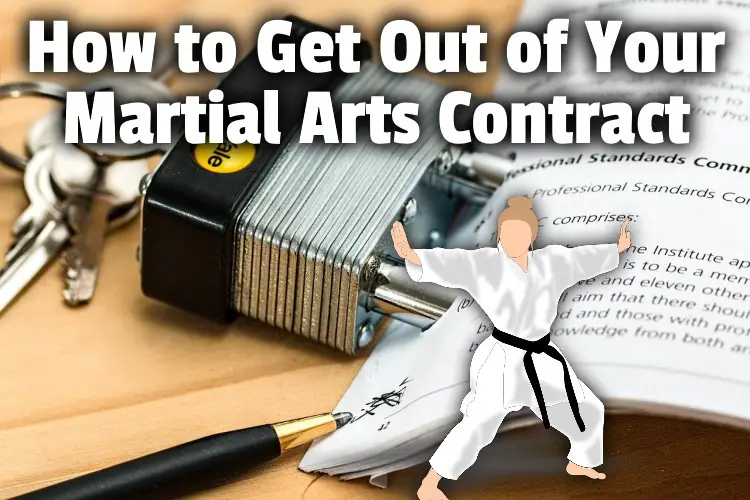
While it’s becoming less common, many martial arts schools still require contracts. So, if you or your child have decided to stop training, here’s how to get out of your martial arts contract:
As a general rule, most martial arts contracts have a cancellation fee that can be paid to effectively end the contract. However, in most cases, a 30-day (paid) cancellation notice can be given, and the school is unlikely to send the account to collections for any remaining balance.
But there’s a lot more to know.
In this article, we’ll find out how to know if a martial arts school would turn you over to collections if you were to fail to honor the contract. And we’ll look at why do martial arts schools have contracts. But we’ll also explore what happens if you stop paying for martial arts classes.
Let the fun begin.
Here’s how you can save money on credit card and ACH processing fees in your martial arts school. https://t.co/trbBmCfoOl pic.twitter.com/PHzDvtS0Ug
— Mike Massie (@mabizdaily) June 20, 2019
Will a martial arts school turn me over to collections if I don’t honor my contract?
Most martial arts schools will not turn a student over to collections for non-payment on a contract due to the risk of bad word of mouth or a social media backlash. But any time a debt is owed with a written signed contract, the debt could be turned over to a collection agency.
So, they can, but probably won’t.
But if you want to make sure they don’t, the easiest thing to do is to pay the cancellation fee (often 1 or 2 months of tuition, sometimes in addition to paying 30-days tuition).
I once canceled my contract at a BJJ school and had to pay 90 days’ tuition (about $300) to get out of it. I could have walked away and then disputed the charges as they showed up on my credit card statement.
But I also recognized that it was my choice to sign the contract in the first place.
The reality is that using collection agencies is gradually being an outdated practice because of the negative impact it can have on a martial arts school’s brand and relationship with former students.
And many martial arts schools don’t use contracts anymore (the school I ran for 8 years had abolished them a few years prior to my starting there).
In those cases, you simply give a 30-day (paid) notice to cancel.
But if a dojo does turn you over to collections, don’t pay anything yet. Instead, always negotiate with collection agencies.
After all, they probably paid (at most) about 20-25% of what you supposedly owed the school when they bought the debt from the dojo.
So, if you owed $300, they probably gave the dojo $75.
So, chances are, you could offer them $100 or $150, and they would be happy. But before you do that, get it in writing from the collection agency that they consider this payment in full.
Also, get it in writing that they won’t report anything to the credit bureaus and, if they already have, that they will remove those entries within 30 days of payment. Then, and only then, should you pay them.
By the way, what’s the best age for a child to get started learning martial arts?
This is the theme of a recent article where I looked at whether a teenager is too old to start learning martial arts and what age is too late to start learning martial arts. But I also shared the best martial art for girls.
Just click the link to read it on my site.
Since the client was a martial arts instructor I thought it was appropriate to present the contract in scroll form. pic.twitter.com/Swnt4BNhar
— Harvey Case (@therealMetonym) February 12, 2016
Why do martial arts schools have contracts?
Contracts were first used at martial arts schools as a way of helping ensure students (often, but not always children) stayed in the program longer. But they also do this to ensure a more consistent income stream compared to allowing students to quit at any time.
And as with gym memberships, they are also a way to generate additional income without requiring anything in return.
Of course, dojos are businesses with a lot of overhead.
The owner(s) of the school has to pay for an attractive and conveniently located space, equip it with the proper equipment, pay instructors and administrators, and other expenses.
Contracts help ensure a steadier stream of income which makes monthly predictions of profit or loss easier to estimate.
So, contrary to what some people think, greed is not the only motivation.
It’s common sense; after all, the schools know that the more financially committed folks are to any activity, the more they’re likely to discipline themselves to complete the program.
We’re all likely to stick to what we’re paying for.
Running a martial arts school is not a walk in the park, and some students quit. Contracts are essential for having consistent cash flow.
But as I mentioned, contracts are being phased out by a lot of martial arts schools. So, if the school you’re considering uses them, chances are there’s another one a few miles away that does not.
Of course, contracts aren’t the only (or even primary) way you should be picking a school.
How do you go about picking the very best dojo for your child? In a recent article on my sister site, I revealed the exact steps you should follow to find, vet, and select the perfect school. But I also shared one thing that if you see, you should immediately leave.
Just click the link to read it on my site.
Kickfit Martial arts Academy is reopening Saturday 25th!. You will have to book for the classes and pre pay. If not paying already. PayPal payments to. [email protected]
Kids 11am .Adult JKD /Kickboxing 12noon. Eskrima Kali Arnis 1pm.kids £5.50.Adults £10.Per class.£15×2 pic.twitter.com/jAAjFSEm9F— Richard Hudson (@KickFit_Notts) July 19, 2020
What happens if I just stop paying for martial arts classes?
If a contract was signed, and the student stops paying, the dojo can turn the account over to collections. But chances are the tuition was set up to auto-draft, in which case, it will continue to go through. But the charge can later be disputed with the credit card company.
However, if the dojo fights the dispute and provides a copy of your signed contract, the credit card company is unlikely to side in your favor.
But it would actually be somewhat rare for a school to turn you over to collections.
They only make about 20 cents on the dollar doing that, and they risk you blasting them on Yelp and Google.
In many cases, you could easily get out of a contract by paying a pre-agreed cancellation fee.
Ideally, you want to have a discussion with this school before you stop paying. At the very least, give them a 30-day written notice (often email will suffice).
In some cases, the school may offer to cancel it, especially if you are facing financial hardship.
If you studied the contract well before you signed it and are protected by law, you could explore a way to opt-out of it amicably. It could be by paying a cancellation fee or negotiating with the school.
In a lot of cases, a school would not want the potential negative effect a protracted legal battle could have on their brand, so they may offer to cancel the contract without any charge.
The truth is that it’s going to be a tough call to expect that you can just stop paying and simply walk away!
Moak: Health Spa Act provides monetary penalties and possible imprisonment for fitness clu… https://t.co/XQaSVTOskH pic.twitter.com/4lJaHucF0p
— WWJX-DT (@TV23JacksonMS) January 2, 2017
Are martial arts contracts valid in my state?
Generally speaking, most martial arts contracts are valid in all 50 states in the US. However, there are some states like Texas that have a Health Spa Act, which limits what can be included in a martial arts contract.
That Act, which other states may also have, was written to combat contracts that dojos and gyms were using that had “deceptive language”, automatic renewals, and excessive fees and penalties.
So without seeing your contract, it’s hard to know if your state has a law like that and if so, your dojo contract was written taking that into account.
Even if your state has a law like that, that doesn’t mean dojos can’t use contracts.
It simply means they have to be written in a way that takes the law into account. What those laws often require (will vary from state to state) usually includes:
- How long the contract can last (usually a max of 3-5 years)
- Usually require a 3-day grace period where a contract can be canceled after first signing
- The cancellation and refund policy must be clearly explained
- Ensures that if finance charges are incurred, they are in accordance with the Federal Truth in Lending Act
There are other considerations too, but those are the primary ones that would affect a dojo.
And if your dojo’s contract wasn’t written within your state’s laws, it is not legally valid.
Conclusion
In the article, we found out if a martial arts school would turn you over to collections if you were to fail to honor the contract and why martial arts schools have contracts. But we also explored what happens if you stop paying for martial arts classes.
Suppose you’re considering starting karate, is it expensive?
In a recent article, I revealed why martial arts are expensive and if karate is an expensive sport relative to others. But I also shared how to avoid karate schools that charge a lot.
I have to point out that while I ran a martial arts school for almost 8 years, and have a lot of experience in working with parents, taking payments, and dealing with past due accounts, my article should not be mistaken for legal or professional advice. If you need legal or professional advice on getting out of a martial arts contract, you should contact a licensed professional in your area.
Image by Steve Buissinne from Pixabay and Image by OpenClipart-Vectors from Pixabay
